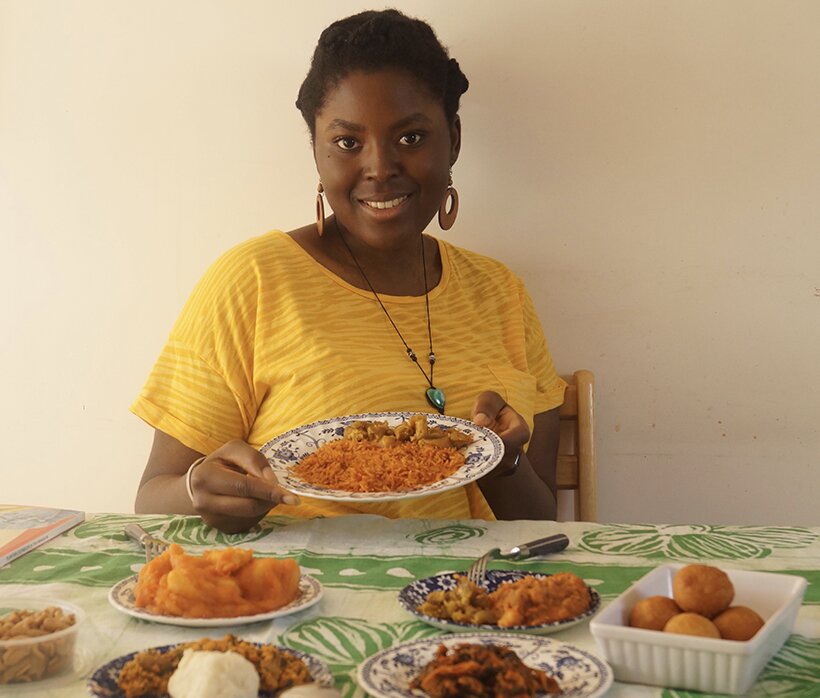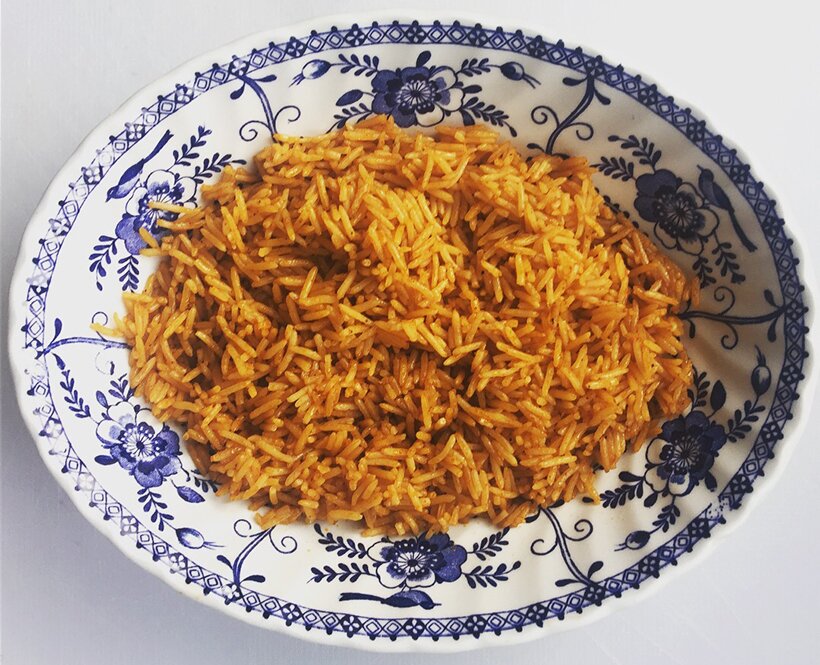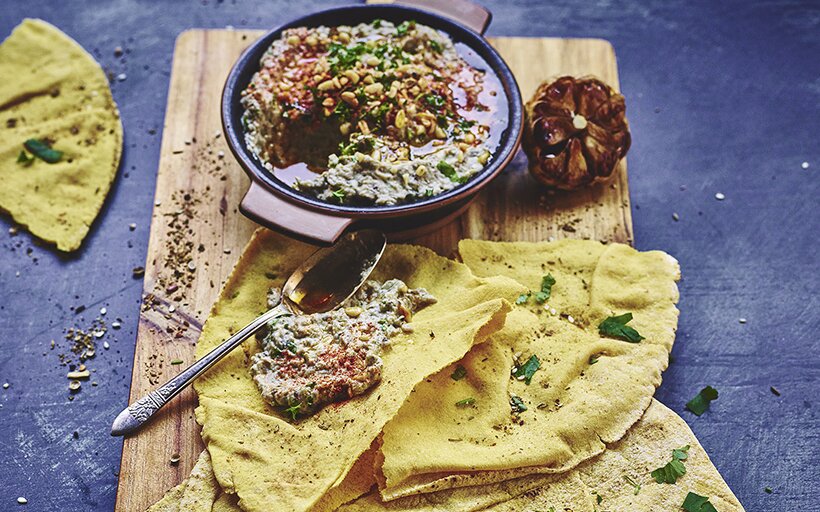World food can be great inspiration for vegan cooking, providing plant-based dishes without sacrificing flavour. Here are the cuisines with the best vegan food ideas
Peter Okwoche looks unconvinced. With vegan Nigerian dishes spread out in front of him at the studios of the BBC World Service's Focus on Africa programme – including mosa (a dish made from plantain), green rice salad and cassava-based garri cookies – he is asked by his co-presenter Sophie Ikenye if he would ever consider forsaking meat himself. Okwoche, a Nigerian broadcast journalist, struggles to sugarcoat it. "I'm not sure, no. Vegan? Probably not."
Happily, Tomi Makanjuola, the young creator of those dishes, is not easily dissuaded. Eight years on from that occasion – when she explained to a sceptical Okwoche how and why she was vegan – the Lagos-raised, London-based Makanjuola has published a book on the subject, Vegan Nigerian Kitchen, as part of her continuing campaign to promote both Nigerian and vegan food in Britain.
And if the notion of vegan Nigerian food still seems fresh, then the rise of vegan cuisine in general over the past few years shows just how quickly things can change. Food trends can take off rapidly in 21st-century Britain. The rise of vegan food is gradually transforming food in the UK, and not just in the most obvious way – that people eat less meat. The nature of vegan food often requires greater creativity from its preparers, and, perhaps, a greater degree of acceptance of different cuisines.
"I think, just by virtue of being vegan, you have to be more open-minded," says Makanjuola. "A lot of food from around the world – from Asia, maybe Africa, definitely India – is vegan-friendly, so you naturally gravitate towards that. I remember when I lived in France, I would end up at North African restaurants, because they had couscous and chickpeas and lentils. If you're vegan, you have to explore beyond an ordinary kind of diet."

It is this sort of open-mindedness that has helped to change British food in a fundamental way. Dishes and ingredients from all around the world are now commonplace in the UK's restaurants. Could Nigerian flavours be our next high-street staples?
The vegan Nigerian
West African talent is everywhere in modern Britain, from the arts to politics, science to food. Nigerian food has long been easy to find on the streets of London, but restaurants such as Peckham's Flygerians – run by sisters Jo and Jess Edun – and West Kensington's Pitanga are bringing dishes like beef suya and pepper soup to a wider audience. With its Brit-friendly mixture of starch and spice, Nigerian food looks well placed to be, if not the next big thing, then at least one of them.
Few understand this better than Makanjuola, whose passion for food began early. "It was such a big part of our life in Lagos," the 30-year-old says. "Family events, special events – it was very central." She initially became vegan for health reasons – she wanted to feel less sluggish and more energised – before arguments about the environment and the ethics of animal exploitation left her in no doubt, she says.
Nigerian food is not vegan – just ask Okwoche! – but there are elements that make it very vegan-friendly. "The key ingredients are starchy vegetables," Makanjuola says. "There's root vegetables like yam, cassava, cocoyam, and we use them in a lot of different forms – from whole, to being ground into a powder and reconstituted to make doughy fufu."

Jollof rice, a West African mixture of rice, spices, tomatoes, onions, vegetables and meat, is already popular in the UK. Makanjuola believes Nigerian stews and soups, such as buka stew (normally made with meat, but Makanjuola has created a vegan version) could follow. "They are central to Nigerian cuisine, to West African food in general," she says. "They're highly nutritious, there's a real convenience to these one-pot meals, and they're a chance for people to explore new ingredients."
Nigerian food may be on the starting blocks in the UK, but vegan food is racing along. "It's been surprising how quickly it has grown," Makanjuola says. "When I first went vegan, about 10 years ago, it was still in the shadows. It's been really encouraging to see restaurants taking it on, realising there's a market for it."
Middle Eastern eats
If you want an idea of Nigerian food's potential trajectory over the next few years, Lebanese cuisine could offer a good guide. Once restricted to a handful of London neighbourhoods, it is now increasingly common around the UK, thanks to independent traders and expanding chains such as Comptoir Libanais. Healthy and suitable for vegans and meat-lovers alike, it offers a deliciously comforting mix of colours, flavours and textures.
It's no surprise, then, that Lebanese ingredients and dishes are increasingly easy to come by. Frozen food distributor Central Foods, for example, has recently launched its KaterBake range of Lebanese flatbreads, available in a selection of flavours and sizes. There's beetroot, carrot and spinach flatbreads, along with plain versions; the flavoured options are 10in in diameter, while the plain versions are available in 8in, 10in and 12in diameters.
"Lebanese flatbreads are incredibly versatile," says Gordon Lauder, managing director of Central Foods. "They can be used as wraps, pizza bases, traditional accompaniments to hummus and dips, or for dipping into olive oil flavoured with herbs. They more than earn their keep in any professional kitchen."
James de Jong, development chef at Creed Foodservice, says Lebanese food is exciting and cost-effective, while its focus on flavoursome veg is good news for operators in these straitened times. "Lebanese food is heavily vegetable-based (meat kebabs aside) and so lends itself to big healthy salad mixes," he says. "This means the mark-up can be good for caterers. You can have classic Lebanese salads such as fattoush or tabbouleh, which can either be served alongside a main or in their own right, with various toppings such as falafel, marinated chicken, spicy potatoes or roasted vegetables. These are also perfect for both takeaway and dine-in options."
Lebanese spice mixes, such as those used in batata hara (spicy potatoes), are increasingly well known in the UK. "Levantine foods are fresh, full of flavour, colourful, varied, suitable for sharing and packed full of healthy ingredients such as chickpeas, seeds, nuts, beans, pulses and spice blends such as baharat, za'atar and sumac," says Tasneem Alonzo, joint managing director of Lähde (an EHL Ingredients foodservice brand).
Tilda says that there has been a rise in popularity in world dishes such as Middle Eastern and Asian cuisine due to their rich layers of flavour and versatility. "Maintaining a healthy diet is important for good physical and mental health and offering nutritiously dense food, which is important for any setting but particularly so for hospitals," says Annette Coggins, head of foodservice, Tilda UK. "Rice is a great way to introduce big, bold-flavoured dishes that don't hold back on versatility. Adding rice to your menu is also an excellent way to cater for special diets, including vegetarian or plant-based, those who are meat-eaters and the more health conscious among us."

Lebanon, of course, also has a rich wine-making tradition. Lebanese winery Ixsir focuses on the country's best terroirs and cultivates vines on sustainable agriculture principles. Its vineyards reach an altitude of 1,800 metres, which makes them the highest in the northern hemisphere; its Altitudes Red 2018 is a bright, black-cherry laden mixture of Cabernet Sauvignon, Syrah, Caladoc and Tempranillo.
Flavour town
The desire for new flavours is linked to a yearning for authenticity, as slippery a concept as that may be. Ian Nottage, head of food development at Sysco Speciality Group, says this impulse has driven what is grown as well as served to customers in the UK.
"Chefs are constantly seeking out genuine ingredients, whether that be a Poblano or aji amarillo chilli for South American and Peruvian dishes or lotus root for Asian recipes," he explains. "It is encouraging to see the more forward-thinking UK growers investing in and experimenting with non-native crops in order to deliver authenticity and a much fresher, locally produced product. After all, if you go back 10 years or so, who would have thought that we would be growing pak choi, shiso and wasabi in this country?"
Asian food specialist Lee Kum Kee has released three new cooking sauces, designed "to allow chefs of all abilities to explore their culinary skills and add magic to their dishes". The new products – a vegetarian stir-fry sauce (with shiitake mushroom), a Chinese-style honey barbecue marinade (char siu sauce), and a chow mein stir-fry sauce – are premixed for mainstream catering use.
"We are continually looking for new ways to entice adventure-seeking palates by taking them on a flavour journey," says Maria Chong, managing director. "With our expert knowledge of ingredients and flavours, we curate products that will inspire and shape people's tastes for many years to come."
Foodservice supplier BaxterStorey has been working with its street food agency Fuel to "bring passionate vendors, who understand the heritage and street scene, to the forefront of client hospitality", according to Alice McGall, its head of marketing. Among the number is food truck business BeyRoots, which was created by Tariq Khaldi in 2016, "with the goal to provide authentic, tasty, and affordable Lebanese food to the people of London."
Meanwhile, for those looking to make cheese work with Mexican and Tex-Mex food, Kerrymaid suggests its grated red and grated white, "which produce a more even melt than standard Cheddars".
Michelle Younger, marketing manager at Aimia Foods, says those aiming to make a cake with a unique flavour should use its Drink Me Chai brand's spiced chai latte. "This beautiful blend allows caterers to transform any traditional cake or biscuit into one that's packed full of flavour. With notes such as cinnamon, ginger and cardamom included, this blend can transform desserts, bakes and breakfast options into something special."
The spices and textures found in Nigerian food can be equally transformative. For now, an appreciation of this West African cuisine is gradually spreading out from London to the rest of the UK. And when it comes to vegan dishes, Makanjuola is sure to play a significant role. She's certainly a tireless advocate.
"I'm pushing forward with my online workshops. It's a great way to get the message out, to get people cooking the food and exploring the ingredients," she says. "And then, who knows, maybe another cookbook?"
Suppliers
BaxterStorey www.baxterstorey.com
Central Foods www.centralfoods.co.uk
Creed Foodservice www.creedfoodservice.co.uk
Drink Me Chai www.aimiafoods.com/brands/drink-me-chai/
EHL Ingredients/Lahde www.ehl-ingredients.co.uk
Ixsir www.ixsir.com
Kerrymaid www.kerrymaid.com
Lee Kum Kee www.lkkprofessional.com
Peppadew www.peppadew.com
Sysco www.syscospecialitygroup.co.uk
Tilda www.tilda.com









